Maine Coon cats are renowned for their impressive size, gentle demeanor, and striking appearance. As one of the largest domestic cat breeds, Maine Coons have unique dietary needs that require careful consideration to ensure optimal health and well-being. In this article, we explore the factors that influence how much to feed a Maine Coon cat, from their size and age to their activity level and dietary preferences.
Understanding the Maine Coon Breed: Characteristics and Dietary Needs
1. The Majestic Maine Coon Cat
Maine Coon cats are known for their robust build, tufted ears, bushy tails, and thick, water-repellent fur. Originating from the northeastern United States, these gentle giants are revered for their friendly disposition, intelligence, and adaptability to various environments. Despite their size, Maine Coons are agile and athletic, making them well-suited for both indoor and outdoor living.
2. Unique Dietary Requirements
Due to their large size and active lifestyle, Maine Coon cats have distinct dietary requirements compared to other domestic cat breeds. Proper nutrition is essential for maintaining their overall health, supporting growth and development, and preventing obesity-related health issues. Understanding their nutritional needs is crucial for providing them with a balanced and nutritious diet.
Example of Breed Characteristics:
Maine Coon cats are one of the largest domestic cat breeds, with adult males typically weighing between 13 to 18 pounds, and adult females weighing between 8 to 12 pounds. Their size and muscular build require a diet rich in protein and essential nutrients to support their energy levels and maintain optimal body condition.
Factors Influencing Feeding Guidelines for Maine Coon Cats
1. Age and Life Stage
Like all cats, Maine Coons have different dietary needs depending on their age and life stage. Kittens require a diet that is rich in protein and essential nutrients to support their rapid growth and development, while adult cats benefit from a balanced diet that helps maintain their weight and overall health. Senior Maine Coons may require specialized diets to address age-related health concerns, such as joint health and dental care.
2. Activity Level and Lifestyle
Maine Coon cats are known for their playful and energetic nature, often engaging in activities such as climbing, jumping, and exploring their surroundings. Their high activity level requires a diet that provides sufficient calories and nutrients to support their energy needs and promote muscle development. Indoor Maine Coons may have lower energy requirements compared to outdoor cats, requiring adjustments to their feeding regimen accordingly.
Example of Lifestyle Considerations:
Maine Coon cats that have access to outdoor environments may have higher energy requirements due to increased physical activity and exposure to environmental stimuli. Providing them with a diet that meets their nutritional needs while accounting for their activity level is essential for maintaining their health and vitality.
Determining the Right Amount of Food for Your Maine Coon Cat
1. Consulting with a Veterinarian
Before determining how much to feed your Maine Coon cat, it’s important to consult with a veterinarian to assess their individual dietary needs and health status. A veterinarian can provide personalized recommendations based on factors such as age, weight, activity level, and any underlying health conditions.
2. Following Feeding Guidelines
Feeding guidelines provided by pet food manufacturers can serve as a helpful starting point for determining the appropriate amount of food to feed your Maine Coon cat. These guidelines typically recommend feeding amounts based on the cat’s weight and life stage, with adjustments made for activity level and metabolic rate.
Example of Feeding Guidelines:
A reputable pet food manufacturer may recommend feeding a Maine Coon cat approximately 1/2 to 1 cup of dry food per day, divided into two or three meals. However, individual cats may require more or less food depending on factors such as age, weight, and activity level. It’s essential to monitor your cat’s body condition and adjust their feeding regimen accordingly to maintain a healthy weight.
Monitoring Your Maine Coon Cat’s Weight and Body Condition
1. Regular Weigh-Ins
Monitoring your Maine Coon cat’s weight is an essential aspect of their overall health management. Regular weigh-ins can help track changes in weight over time and identify any potential issues, such as weight loss or gain, that may require adjustment to their feeding regimen or veterinary intervention.
2. Body Condition Scoring
In addition to weighing your Maine Coon cat, assessing their body condition can provide valuable insights into their overall health and nutritional status. Body condition scoring involves evaluating factors such as the cat’s body shape, muscle tone, and fat distribution to determine whether they are at an ideal weight.
Example of Body Condition Scoring:
A Maine Coon cat at an ideal body condition will have a visible waist when viewed from above, with a slight tapering of the abdomen. Their ribs should be easily felt but not visible, and they should have a moderate amount of muscle tone throughout their body. Adjustments to their feeding regimen may be necessary if their body condition deviates from the ideal.
Conclusion: Providing Optimal Nutrition for Your Maine Coon Cat
In conclusion, determining how much to feed your Maine Coon cat requires careful consideration of factors such as age, weight, activity level, and lifestyle. Providing them with a balanced diet that meets their nutritional needs is essential for promoting their overall health and well-being.
By consulting with a veterinarian, following feeding guidelines provided by pet food manufacturers, and monitoring your cat’s weight and body condition, you can ensure that your Maine Coon cat receives the proper nutrition they need to thrive. With proper care and attention to their dietary needs, your Maine Coon cat can enjoy a happy, healthy, and fulfilling life by your side.


























